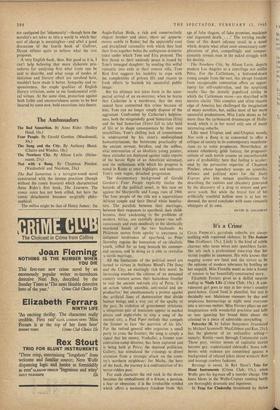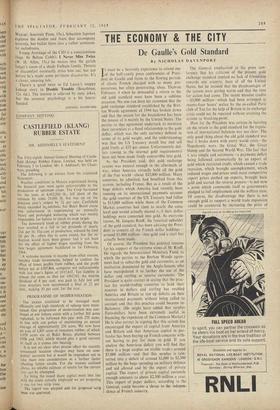It's a Crime•
CELIA FREMLIN'S garrulous suburbs are always seething with repressed violence. In The Jealous One (Gollancz, I5s.), Lindy is the kind of subtle charmer who turns wives into speechless furies. She sets such a professional man-trap that her victim topples in unawares. His wife knows that nagging scenes are fatal and she strives to be the epitome of modern tolerance by bottling up her anguish. Miss Fremlin sends us into a frenzy of tension in her beautifully-constructed story. Elizabeth Ferrars gives us a skilful surprise ending in Ninth Life (Crime Club, 15s.). A con- valescent girl goes to stay at her sister's country guest-house. Good food is plentiful, but rest is decidedly not. Malicious rumours by day and suspicious hammerings at night send everyone into a nervous twitter. Miss Ferrars plays on our imaginations with wonderful precision and lulls us into ignoring her broad hints about the criminal in a piece of admirable storytelling. Petrovka 38, by Julian Semyonov (translated by Michael Scammell; MacGibbon and Kee, 21s.), has the glamour of an unfamiliar setting— namely, Russia—seen through Communist eyes. Those grey, sinister streets of capitalist stories become gay, sophisticated sidewalks. Some rob- beries with violence are committed against a background of relaxed jokes about Workers' flats and teenage cowboy fashions. Revenge is sweet, in Rex Stout's Trio for Blunt Instruments (Crime Club, 15s.), when Wolfe gets his leg-man off a murder charge. The latest blows in the Wolfe-Cramer running battle are thoroughly dramatic and ingenious.
In Trap for Cinderella (translated by Helen
Weaver; Souvenir Press, I5s.), Sebastien Japrisot explores the doubts and fears that accompany amnesia, but builds them into a rather sentimen- tal melodrama.
Young Armitage of the CID is a conscientious chap. In Belton Cobb's I Never Miss Twice (W. H. Allen, 15s.) he moves into the garish lodger's room of a shady Fulham family. Threats of discomfort eventually drive him out, but not before he's made some pertinent discoveries. It's a clever, amusing tale.
There's a good twist to Ed Lacey's snappy kidnap story in Double Trouble (Boardman, 12s. 6d.). The tension is relieved by zany jokes, but the amateur psychology is a bit heavy- handed.
ANTONIA SANDFORD


































 Previous page
Previous page